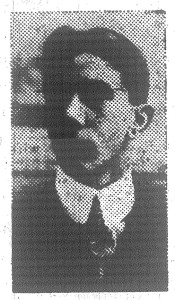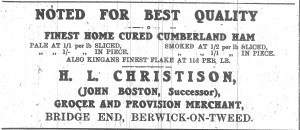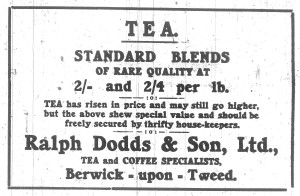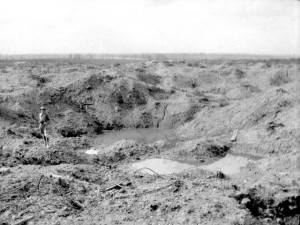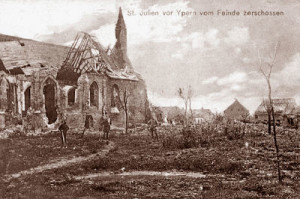
BERWICK ADVERTISER, 17 MAY 1918
War News
BERWICK MAN AWARDED M.M.

Another hero has to be added to the already large list of Berwickers who have performed deeds of valour during the present war. Mrs Dunlop, 47 West Street, Berwick, has received intimation that her husband, Private William Dunlop, K.O.S.B., has been awarded the Military medal, along with a parchment certificate which reads as follows :- “28831 Private Wm. Dunlop, K.O.S. Borderers.

I have read with much pleasure the report of your Regimental Commander and Brigade Commander regarding your gallant conduct and devotion to duty in the field on the 11th April, 1918, near Neuf Berquin, and have ordered your name and deed to be entered in the record of the – Division – D.E. Cayley, Major-General Commanding.
Private Dunlop was called up as a Reservist and served with the Division at the Retreat of Mons. He was wounded in 1915, and was invalided to this country, and after convalescence he did garrison duty at Inohkeith, Inchgarvie, Kirkcaldy and Leith. Returning to Duddingston Camp he was then passed “A1” and proceeding with a draft of the K.O.S.B.’s to France he joined the – th Division, to which he is still attached. This Division has been seen much heavy fighting, having been at the Gallipoli, 1915-16. At the evacuation of the Peninsula they came to France, and were present at the Somme 1916-17, Arras, 1917, Ypres, 1917, Cambrai 1917.
Private Dunlop was home time expired at the beginning of the present year on a month’s furlough. We heartily congratulate him on the distinction he has won. He was for some time working at Scremerston Colliery, and thereafter was a salmon fisher with Berwick Salmon Coy. He is a son of Mr Andrew Dunlop, Church St., Berwick.
BELFORD OFFICER WINS MILITARY CROSS

It was quite a pleasure to us to learn some little time ago that Second Lieutenant Wm. Hall, eldest surviving son of Mr and Mrs Richard Hall, High Street, Belford, had been awarded the Military Cross. We would at once have recorded the fact but were forbidden. It has, however, now appeared in a military journal and the words culled from it are as follows: – “He dis-great courage in hand to hand fighting in an attack, personally killing many of the enemy, and led his platoon to their objective. Throughout many hours fighting he rendered his battalion valuable service.” Personally we are proud to know the gallant Lieutenant, and heartily congratulate him. Lieut. Hall has lost two brothers in France, and that fact is sufficient to fire any fellow with the spirit of a man in him to lay out as many Huns as he possibly can whenever an opportunity presents itself. Some time ago he was sent to Italy, and is still there. We hope he is safe and well, and may continue to be till the Central Powers are beaten.
Lieut N. S. Craig’s Gallantry
STIRRING STORY OF BRAVERY IN FACE OF THE ENEMY
Some weeks ago it gave us pleasure to record the award of the Military Cross to Second-Lieut. N.S. Craig, Royal Scots, son of Mr N.M. Craig chemist, Berwick, and the official account of the action which earned the decoration now published brings to light a story of true British pluck and daring.
The following is the official record:-
For conspicuous gallantry and devotion to duty during a counter-attack. When ordered to gain touch with the unit on his right, he led his men forward over the open in daylight under intense machine gun fire, and occupied the ground immediately in rear of the original outpost position. He then went forward alone in full view of the enemy, reconnoitered the position, and found that it was not occupied by the enemy. He returned, and moving about in the open still under heavy fire, established his men in good positions. Later, when ordered to withdraw, he sent his men back in small parties, and was himself the last to leave. He rendered most valuable service in clearing up the situation. Throughout the whole operation he showed great coolness under fire, and by his courage and contempt of danger, set a magnificent example to his men.
Second Lieutenant Craig has now been allowed leave to continue his medical studies at Edinburgh University, and his many friends will, we are sure, wish him many years of life to wear his coveted distinction.
THE CROIX DE GUERRE FOR A WOOLER LAD

Mr and Mrs Brodie of Ramsay’s Lane, Wooler, have had a further communication from their son Sergeant Marcus Brodie that he is to obtain the above French decoration for conspicuous gallantry displayed at the battle of Cambria. It appears that when the British were being pressed back Sergt. Brodie gathered a handful of men together and held the enemy in check for ten hours until assistance arrived. The Croix de Guerre is somewhat similar to our Victoria Cross and serves certain privileges with it. We heartily congratulate Marcus on his well-earned honour and hope to see him back amongst us at no distant date wearing his highly prized and coveted decoration.
MEAT COUPONS VALUE INCREASED
As from May 12 and until further notice the meat coupon will be available for the purchase of 6d worth of butcher’s meat instead of 5d worth as hitherto.
Up to May 5th the public were able by using their coupons on their meat cards to obtain 1s 3d worth of butcher’s meat weekly. On May 5th this quantity was reduced to 10d worth by the reduction of the number of coupons that might be used for buying butcher’s meat from three to two. The present concession, by enabling the public to buy 1s worth of butcher’s meat weekly, compensates in part for the reduction of the number of coupons that may be used for that purpose.


